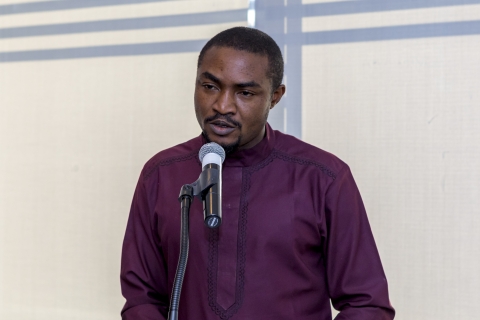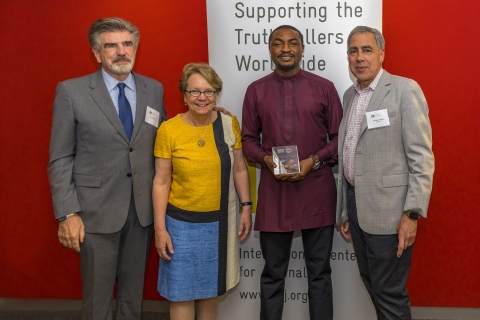
Journalists have a responsibility to show the humanity of people they cover and not treat them as statistics or faceless entities, says a Nigerian journalist whose powerful reporting about victims of the Boko Haram terrorist group earned him a coveted international award.
Abubakar Ibrahim, a news editor for Daily Trust newspaper in Abuja, Nigeria, followed the tortuous journeys of two women whose families were torn apart after Boko Haram attacked their villages. His story, All That Was Familiar, was published in Granta magazine in May 2017. More than 2 million people from northeastern Nigeria, northern Cameroon and southern Niger have been internally displaced by the terrorist group.
“Journalism for me is identifying brave women and men like these from those numbers and sharing their stories with the world, to remind ourselves of our failings, the people we have failed and the lives they had and lost,” said Ibrahim, 2018 recipient of the Michael Elliott Award for Excellence in African Storytelling.
The prestigious award is given by the International Center for Journalists (ICFJ) in partnership with ONE and the Elliott family. It was established in 2016 in honor of Michael Elliott, an outstanding editor and philanthropist whose life was a testament to the power of storytelling to bear witness to and improve the human condition.
"It is our obligation to not only hold leadership accountable, but also to remind ourselves that we are accountable for the privilege of our humanity,” said Ibrahim, speaking to a gathering of media leaders and supporters in New York City.

“It is clear that Michael Elliott felt this sense of responsibility as a journalist and acted on it,” said Ibrahim.
“He also took this moral stand and went beyond the call of his duty to alter the human condition through his humanitarian gestures and championing storytelling as a tool for empowerment.
It is for this reason that I am extremely delighted and genuinely honored to stand before you tonight to receive this award which bears the name of this distinguished gentleman.”
Ibrahim said he hopes the award “will inspire other African journalists to take ownership of our stories, the ones that matter to us the most, and how these stories are told.”
Ibrahim was the second annual recipient of the award, which honors Elliott’s commitment to use great storytelling as a tool for empowerment. The inaugural winner was Kenyan health reporter Mercy Juma.
Elliott died in July 2016 after serving as president and CEO of ONE, Bono’s foundation. Previously, he was a top editor at three great news magazines - TIME, Newsweek and The Economist. He served as a member of the ICFJ board of directors for eight years.
Photo credits: Steven Strasser